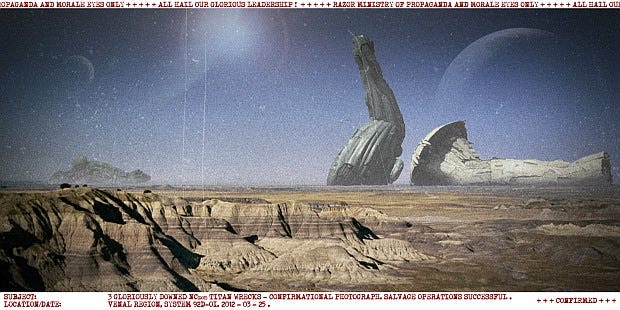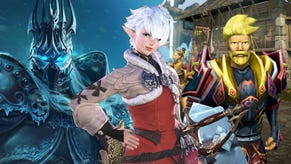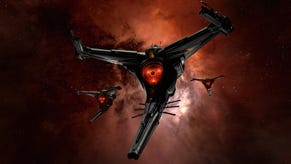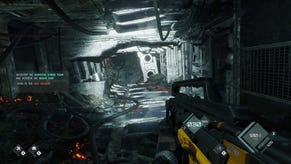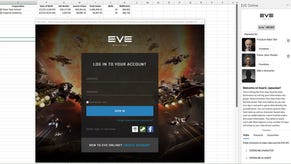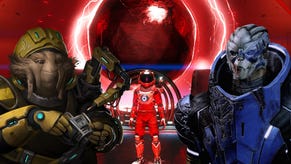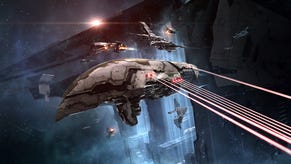Meet The Players Who Create EVE Online Propaganda
How to rally space troops
Samahiel Sotken is not your average EVE Online player. While most are defined by how they spend their time in the game, like blowing up defenseless miners for example, Samahiel's influence in EVE is more profoundly felt by the time he spends outside of the game. He is a diplomat for the Goonswarm Federation, the most powerful alliance in EVE that spearheads a coalition of alliances known as The Imperium, but he is also the director of the Ministry of Truth. For those who might not understand the reference to Orwell's "1984", The Ministry of Truth is The Imperium's very own propaganda branch. From within this shady organization radiates the whispers that dismantle alliances, turn defeats into victories, and weave the yarn of EVE's living narrative. Samahiel is a propagandist.
If you ever wanted proof that EVE Online is the strangest, most surreal MMORPG available, Samahiel is a good place to start. He illustrates the way that EVE has evolved from beyond the confines of its installation folder on your hard drive—no longer a game but a virtual society where people like Samahiel contribute in ways that often transcend the mechanics of EVE entirely. While most interaction in the galaxy of New Eden is as tangible as a torpedo slamming into your hull, Samahiel's currency is far more subtle. Samahiel deals in control.
"The easiest way to motivate someone is letting them buy into a narrative," Samahiel tells me. "People want to belong to something bigger than themselves that fulfills their values, that enables them to do something they didn't think they could do normally. And if your players don't have that kind of actualization, they don't log in."
Like many successful and renowned pilots in EVE Online, Samahiel brings real world experience and channels that into his game. When he isn't subverting rival alliances as Samahiel, he is working as an architectural lighting designer known as Andrew. As a lighting designer, Andrew doesn't get to choose the art, design the building, or pick the colours, but he does get to choose how to hide or emphasize them. Getting his start creating forum signatures for others, Samahiel is no stranger to creating art for public consumption. He started playing EVE years ago and became a diplomat in Goonswarm before taking over the then defunct Propagoonda and turning it into a coalition-wide organization affectionately known as MiniTru.
"When you look at what kills an alliance, in many cases it is a failure of narrative and internal identity; they're under pressure, they're stressed, and then they're given an out—a way to not have to identify with the fate of the group," Samahiel says.
This event is known in EVE as a "failure cascade", a systematic rippling collapse where an organization of thousands can disintegrate in a matter of hours. In the 12 years that EVE has been around, there has been hundreds of these phenomenons. As Samahiel suggests, a good many of them stem from a schism between upper echelons of alliance leadership and the average joe standing on the front lines.
In EVE, narrative is monumentally important. The entire game is built around the philosophy that a single pilot can knit together the moments of his time spent within the game into a tapestry recounting their experiences. For a character like The Mittani, the leader of The Imperium, that tapestry is the legend of how his ruthless espionage burned the biggest alliance to the ground, creating his own empire in the ashes. But while there is a large focus on a single player's story, you must not underestimate the importance of the narrative and identity surrounding a whole organization.
Credit: Stahlregan
Rixx Javix knows this all too well. He used propaganda to sell his own idea for an alliance known as Stay Frosty, an idea that hundreds of pilots have now flocked to in support of.
"Virtually, everyone who is involved in the corporation and the alliance believes it wholeheartedly," Rixx tells me over Skype one evening. "It's an exponential expansion of an idea that has really taken root and become reality."
The "it" that everyone believes wholeheartedly is a simple concept for a pirate alliance based around "old fashioned" solo and small gang combat, free from the cheap tricks that many players use today to gain an edge out in space. But even the idea itself, of returning to the good ol' days of player versus player combat, is false.
"It's nostalgia for a time that never existed."
Rixx Javix is no stranger to using propaganda to sell his ideas to a wide audience. In fact, he's built a whole career out of it. He runs a popular blog known as Evoganda, which houses his experiences within the game while providing discussion to various aspects of EVE and showcasing his own brand of EVE propaganda.
Outside of New Eden, Rixx is known as Bryan Ward and has over 30 years of experience working in advertising and media, and it shows. He has worked with Marvel, ghost written a comic book or two, and did some creative directing and marketing for Panasonic's 3DO. He's even worked with CCP in an official capacity, turning his artwork into official posters for the game.
 Credit: Rixx Javix (click to enlarge)
Credit: Rixx Javix (click to enlarge)
When people talk about propaganda, it can hard not to think of it as some threatening poster pasted to a drab concrete wall. Even the word propaganda sounds nefarious and alien, like a codeword you'd find scrawled on paper crumpled in a dead villain's hand. But the truth is propaganda is far more nuanced and subtle than the hamfisted implementations we easily target, and it isn't necessarily evil.
"Propaganda is a loaded term," Samahiel jokes. "It's bad propaganda in and of itself."
Talking to The Mittani, the leader of Goonswarm and The Imperium, he believes that propaganda built on lies, which many mistakenly believe is how it's made, is simply ineffectual.
"Most people fail to grasp what is the most effective way of communicating, and that is to actually tell the truth. The fact is that EVE players are incredibly smart in general," The Mittani tells me. "So, when people think about propaganda, and they have no idea what they're dealing with, they think that if they just treat their people like idiots, you know, do some cheerleading, do some pom-poms, that they will then sway people. That's not how it works."
Another often misunderstood element of propaganda is that it also transcends any one specific form of media. While it might be most obvious as an image or a video shared on the EVE forums or subreddit, it can also exist as something more nebulous, like a mantra or a song. Though the mode through which propaganda is transmitted varies, one aspect of it is always crucially important: To be effective, it must resonate and impart a message on its audience.
"You have to figure out what the goal is and what the message going to be," Rixx says. He goes on to describe that, in EVE, propaganda typically takes two forms: one meant for consumption within your alliance, usually to motivate players or communicate a vision, and the other meant to destroy the will of your foes and sow discord. Of course, propaganda can also exist with other intentions, like recruitment, but these two play a far more crucial role in the survival of an alliance.
One important aspect of propaganda is that it needs to be relatable to an audience. Unsurprisingly, propaganda in EVE Online often draws from real world influences because of how easily that aesthetic language is understood. The Second World War is fertile ground because of the familiarity of propaganda from that era. Another reason is the sense of militarism shared between the culture of EVE Online and the culture of western society at that time. RAZOR is an alliance renowned for their extraordinary propaganda which draws almost exclusively on World War II.
"There is a feeling, or something being evoked, by a commonly understood iconography. By adopting that, you're able to attach more significance to what you're doing than what was there to begin with," Rixx says.
"World War 2 propaganda was drawing upon some very fundamental truths about what people react to in forms of composition, in forms of colour, and in forms of narrative," Samahiel adds.
While people like Rixx Javix and Samahiel Sotken certainly bring a serious degree of artistry to their work, propaganda doesn't need flare to be effective. The following image, little more than a meme, is often considered one of the better forms of propaganda to come from Goonswarm. It is simple, but the implication of its message is crucial in demonstrating the influence a single player can have in the game.
Samahiel is no stranger to propaganda meant to reinforce the vision and identity of an alliance; Goonswarm exists solely because of how strong their identity is. In the aftermath of the Second Great War, when The Mittani orchestrated the defection of a key player in the enemy alliance and then sabotaged their entire infrastructure, Goonswarm had already cemented themselves as the villains of EVE Online.
"It became a self-fulfilling prophecy," Samahiel says. "What might start off as a rumor, or a couple of guys being taken out of context, when it starts being hammered into everyone it becomes self-reinforcing."
Goonswarm's tenure as the "Big Bad" of EVE Online is only furthered by how insulated their community can feel from the rest of the game. Goonwaffe, the core corporation of Goonswarm, only recruits from the SomethingAwful.com forums where the community originated from. Members are free to run recruitment scams on players, sometimes stealing billions of ISK (the in-game currency), and even when The Mittani himself drunkenly took the stage at EVE Fanfest and made some rather awful comments that resulted in a 30 day ban, it fed into that identity.
But the internal propaganda of Goonswarm doesn't always have to ring that same note like a bell, there is wide number of areas it can target. Consider this video by the prominent Goonswarm member affectionately called Uncle Suas, which uses the familiarity of The Beatles to teach new goons some basics about flying with them. Pay special attention to the first verse with instructional lines like "When you find yourself inside a bubble, hold your cloak and wait for me. Always follow orders, little bees."
Song by: Suas
But propaganda is never more interesting than when it is used as a weapon instead of a shield.
"Propaganda in and of itself doesn't win wars," says Samahiel. "When you win, it makes your victories appear that much greater. When you lose, it can make your losses disappear from history."
As a weapon, propaganda needs to be far more subtle in order to be effective. While memes, images, and videos will suffice for propaganda meant to build up, tearing down often requires more clever tactics.
In some cases, the fact that EVE Online is a universe shared globally, where Russians, Germans, Spanish, English, and many other cultures share the same space, propaganda as a weapon can be rendered totally ineffective. In a campaign against the Walltreipers Alliance, who were uniformly Spanish, Goonswarm were unable to break their resolve due to their strong cultural bonds. They instead bought the alliance off.
Even so, propaganda as a supplement to a strong military campaign can be devastating. In 2007, during the First Great War, a goon known as RoyofCA entered into hostile territory using a covert ops ship fitted with a cloak. The enemy, an alliance known as RISE who rented their territory from Band of Brothers (the alliance dismantled by The Mittani during the Second Great War), were cornered into a very defensible position. While the larger Goonswarm fleet made plans to siege RISE, RoyofCA began his own campaign. Hidden within his cloak, he began spamming a speech later known as "People of Rise" into the local chat.
Day and night, week after week, the systems of RISE were assaulted by this never ending barrage of propaganda meant to erode their loyalty to Band of Brothers. The speech itself changed frequently, often to rebuff new arguments made against it, to include leaked information from RISE intelligence channels, and to include new developments in the campaign. The people of RISE screeched for it to stop, but RoyofCA persisted. When Goonswarm finished an operation that allowed them to deploy fleets within arms reach of RISE's home systems, coupled with a new propaganda campaign known as the Eye of Terror, RISE were so demoralized, so defeated, that they buckled.
"In a game where you can't kill someone—you can destroy their ship, you can make life hard on them, but they're just going to respawn somewhere—to defeat someone, you have to attack them in their willingness to fight for a cause," Samahiel says.
The lore of EVE Online accounts for the fact that players respawn after dying by using cloning to make them immortal. In a science fiction universe populated by gods, the only way to win is to defeat one's sense of purpose, but in a virtual universe populated by paying customers, the only way to win is to defeat their enjoyment of the game.
But what does that tell us about EVE Online as defined by how we typically perceive games? Where plenty of MMORPGs tend to exist in a one dimensional spectrum of emotion ranging from enjoyment to dislike, EVE readily offers a crucible for nuanced emotions no less complicated than the ones we experience in everyday social life. How common is it for a game to inspire a feeling of disenfranchisement? Of hopelessness? But even more interesting is the fact that those experiences, those emotions, can be defined by a handful of players.
Of course, affiliation with an alliance in EVE isn't like becoming a citizen of a country. If you aren't enjoying where you are, a new horizon is only a hop, skip, and an application to a new corporation away. Yet most MMORPGs treat their guilds as little more than a circle of acquaintances, where involvement in a corporation in EVE is often the foundation for a powerful sense of attachment. Even then, there is a distinct tension between the narrative of a single player, and the narrative of the organization as a whole.
Propaganda also plays an important role in documenting the cultures and identities of EVE. Though works like Andrew Groen's "A History of the Greatest Empires of EVE Online" attempt to historically recount the 12 years of EVE's life, and snippets of EVE history can be found in the imperceptibly dense forum posts, wikis, and blogs of EVE players, propaganda can also be a snapshot of New Eden the likes of which cannot be found elsewhere. Decades later, I expect it'll be an image of the Goonswarm bee or the TEST Alliance Middle-management Dino that will evoke a far more emotional response than the disjointed archives of the EVE forums.
But then what place does objective truth have in the universe of EVE Online? Bringing that up with Samahiel Sotken and Rixx Javix, both were quick to point out the fact that, despite what we tell ourselves, objective truth plays little part in our own universe.
"The future reality emerges from what people believe and what they do, and only a small sliver of what is actually true," Samahiel tells me. "There's a deeper level of this that exists outside the game as well. How do you know what is true? How do you know that your government has your best interests at heart, or that they even have as much control as you think they do."
"There is a point where you have to believe something, and what you choose to believe is going to have a huge impact on what future opportunities are available to you."
And therein lies the most interesting aspect of propaganda in EVE Online, a truth in itself slowly revealed to me as I chiselled it out of the stone while attempting to understand how these attempts to control the narrative impact the culture of EVE. We exist within a whirlwind of assumptions, expectations, and perspectives, and truth is very rarely of any concern.
While some might look at this facet of EVE and see it as a hopeless cycle of oppression, where the many are manipulated into following the vision determined by a few, I see it merely as another fascinating intersection of real life and EVE Online, another instance of a game that never fails to provide insights into our own human nature. If our lives are a struggle to find a path through the torrents of influence affecting us, why would EVE be any different? After all, EVE Online is fundamentally about the people at the end of each monitor rather than the spaces in between them. Or maybe that's just the spin that I like to put on it.
